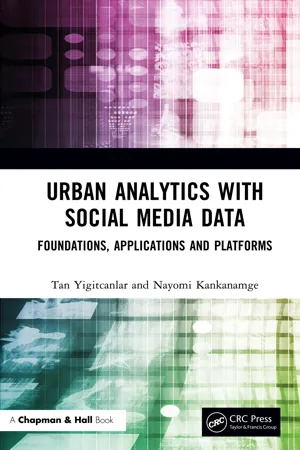1.1 Introduction
Today, in the age of climate change, pandemics, and natural disasters, cities are struggling to function, and operate their amenities and services, in an effective, efficient, and sustainable way. Policymakers, managers, planners, and practitioners are under extreme pressure to first understand the rapid changes happening along with the resulting and constantly evolving challenges, and then develop sound strategies and actions to implement and monitor. This issue has increased the importance of urban analytics, and also brought the data issues. Nonetheless, the exponential growth in social media, at the global level, has created an opportunity, in recent years, to use social media generated big data in urban analytics systems.
Data analytics is an integral part of the decision-making process in urban planning and development. In recent years, with the advancement of digital technologies and analytical capabilities of large datasets, urban analytics systems have started to highly benefit from big data—that is being generated from cities and societies. Besides, the opportunities offered with the wider use of social media channels and resulting user-generated data helps in urban analytics, social media analytics, and big data analytics to work together to produce input into urban planning and development decisions (Kankanamge et al., 2020a).
In conducting urban analytics, social media, as a big data type, can be used to present, such as, the structural changes to a city; and also, for instance, big data patterns in a city can show how governance influences cities’ sustainability performance (Boeing et al., 2021; Kandt & Batty, 2021; Wey & Peng, 2021). The increasing opportunities of analytics for cities bring the need for understanding how urban analytics, social media analytics, and big data analytics work and also interact. A quick look at the literature reveals a trend on the common use of these analytical approaches for smart city, community/society, and governance domains (Kankanamge et al., 2020b; Yigitcanlar et al., 2021). Hence, this chapter focuses on urban analytics with social media big data from the angle of planning for smart cities, communities, and governance.
Smart cities, communities/societies, and governance utilise data as a mean to assist shaping, managing, and smoothly running urban services and amenities effectively and efficiently (Lim et al., 2018; Kandt & Batty, 2021). In order to capture the required data, smart cities employ Internet-of-Things (IoT) and other sensor technologies and methods. The data and analysis, in turn, assist in, for example, detecting and understanding air pollution levels, infrastructure failures, transport system delays, and environmental or public safety risks. Big data-driven urban analytics is a commonly used method in smart cities. Social media analytics is also beneficial for smart cities and communities/societies (Zeng et al., 2010; Kourtit et al., 2019). However, with social media analytics might come some the privacy concerns (Stieglitz et al., 2013; Ye et al., 2020). Smart governance also relies on sensor data captured and analysis, such as IoT, artificial intelligence (AI), and other related technologies (Stieglitz et al., 2013; Kourtit, 2019) to enhance the accuracy of policy and decision-making processes.
Along with the smart city movement, virality of social media use across the globe has led to urban analytics with social media big data to gain recognition as a mainstream method to investigate contemporary and future cities and understand the changes and challenges in urban systems and societies. This chapter aims to expand our understanding on what the opportunities and constraints of urban analytics with social media big data are. To achieve this aim, this chapter employed a systematic literature review approach to reveal the landscape and challenges and opportunities of social media, big data, and urban analytics. The findings generated insights into how urban analytics with social media big data is being used to investigate, understand and act upon the changes and challenges of our cities and communities/societies.
